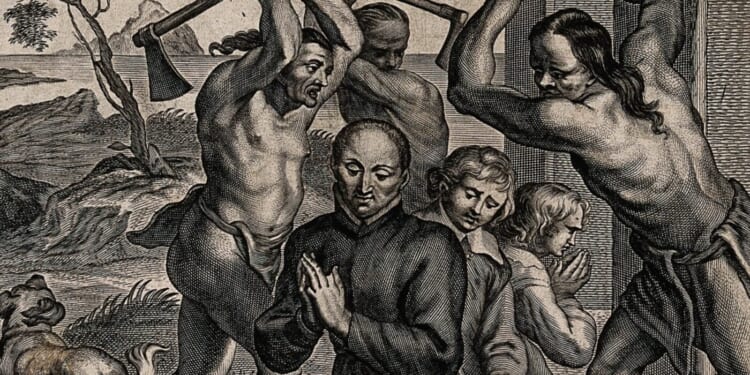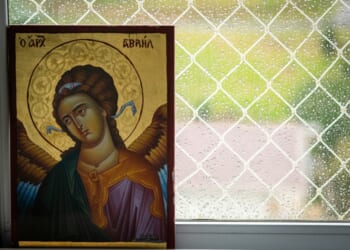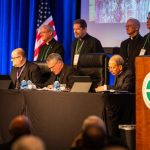St. Isaac Jogues was born in France in 1607. His story in a nutshell is this: recognizing his calling to the priesthood as a young adult, Jogues entered the Jesuit order and was ordained at the age of twenty-nine. He was sent as a missionary to what is now Canada, endowed with the task of bringing Christianity to the Huron and Algonquin Native American tribes. It was an incredibly arduous task as Jogues faced the difficulties of surviving in a wilderness not yet inhabited by the European settlers. Despite the difficulties, Jogues experienced great spiritual joy in carrying out the work to which he was called.
Six years in, he was captured by the Mohawks, enslaved, and tortured. Most anguishing of all, Jogues’ fingers were so badly mutilated, that he was unable to celebrate Mass. Eventually, with the help of Dutch settlers, Jogues escaped his captivity and returned to France, where he was honored and received special permission from the pope to celebrate Mass without the use of his thumb and index finger. It must have been a great joy to have his precious duties restored; still, Jogues’ heart could not find rest until he was back in the land to which God had called him.
Jogues returned to his beloved Hurons, who by this time were working towards peace with the Mohawks. However, after experiencing a crop failure and an epidemic which swept through their tribe, the Mohawks blamed the settlers, and this docile priest was an easy target: he was promptly tomahawked, his body thrown into the Mohawk River. St. Isaac Jogues died a martyr for the Faith.
Honestly, these tortured-and-martyred saint stories have always been a little hard for me to digest. Of course, we understand the value of redemptive suffering offered in imitation of Our Lord, and we even understand that to be willing to accept such sacrifice for the sake of Christ proves how true our faith is. But it just seems that St. Isaac Jogues’ story should have ended…differently. It would be one thing if we could say that because of priests like him, all of North America today is one harmonious Christian nation, settlers and Natives living together in the bond of brotherly love. But instead, the settlers were to blame for the smallpox epidemic that ravaged the Native peoples. And while certainly the missionaries did not intend for this to happen, still, God allowed it.
Now we can get into the history of all the other havoc that the European settlers wreaked upon the Natives: decimating their livelihood (the buffalo) in the hopes of starving them out, taking away their land and forcing them onto “reservations,” swindling them into contracts which they did not understand, and otherwise destroying the simple way of life they had lived for generations. But this is not a discussion on the history of the Native Americans in North America. It is a discussion of God’s hand of divine providence in North America.
If the Lord indeed called St. Jogues to the wilderness to preach in His name—as evidenced by Jogues’ relentless determination to serve the Natives to the point of martyrdom—then why does it seem that his efforts, all these centuries later, have resulted in apparent failure? North America, in large part, is dismissive of the one true God, and worship of His name has been replaced by worship of technology and a hedonistic lifestyle. One can hardly watch a program on television without being all too aware of just how far our nation has sunk in its distortion of truth and debasement of moral law. It can almost feel hopeless. Did St. Isaac Jogues suffer and die for nothing?
There is no doubt about the long history of injustice enacted by many European settlers against the natives of North America. There is no excuse that could ever justify such maltreatment; the damage such abuse would have caused is unfathomable. There is no explanation that could ever be satisfactory enough to answer, “Why?” But there is one thing we must acknowledge: for St. Isaac Jogues, and missionaries like him, who sincerely loved the ones for whom they gave their lives and who desired nothing more than for these souls to come to know the love of Christ, nothing in this world could be worse than a life without God. Such an existence on the other side of eternity is what it means to live in hell.
The chief punishment of hell is eternal separation from God, in whom alone man can possess the life and happiness for which he was created and for which he longs. (CCC 1035)
To suffer in this life is but a drop of pain compared to the joy that awaits us with our Creator in eternity. If we make our pain and suffering about this life, it will never make sense; it will always seem unjust. We will never be able to forgive, nor will we ever be able to fully heal. But if we keep our eyes on the view from eternity, we will realize that even in our darkest moments, the Lord intends to draw out good.
This was the vision that St. Jogues had for North America, and it was the reason he was happy to go back to the land in which he had been tortured and enslaved. Without this vision, he would surely have held in his heart unforgiveness and anger towards his captors, and a desire for revenge. Instead, he had nothing but love for the ones who had wounded him: he looked at them and saw the saints they had the potential to become. Such is the true miracle of St. Isaac Jogues’ life.
It is true that our world, and particularly our nation, seems to be living a lie right now. We can look around us at the political scene, the entertainment scene, the educational scene, and we can begin to despair. Begin to get angry. Begin to desire retribution for those who have rejected God and His laws. But let’s not do that. Like St. Jogues, let us simply love them. Let us see in them the children that Jesus has entrusted to our care, to help them find their way home.
There are poor lost souls who are living in their own personal hell, no matter how much “fun” they seem to be having, because this is what a life without God is. So let us offer them a taste of heaven—which is nothing more than to offer them the unconditional love and mercy of Christ. With just that much, the grace of God will do the rest…until one day, we will truly be one nation, united under God.
Author’s Note: Excerpt from: The Safe Haven: Scriptural Reflections for the Heart and Home (Ordinary Time Weeks 22-28). To purchase, visit Amazon or The Catholic Company, where all other volumes currently in print are also available.
Image from Wikimedia Commons










